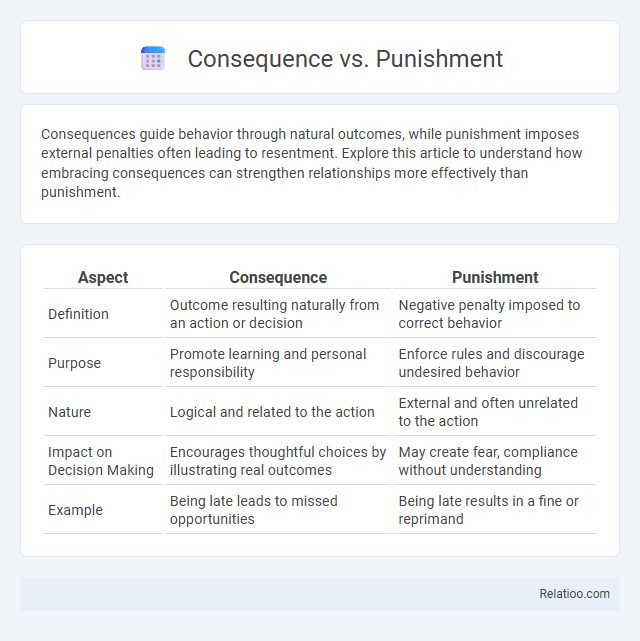Consequences guide behavior through natural outcomes, while punishment imposes external penalties often leading to resentment. Explore this article to understand how embracing consequences can strengthen relationships more effectively than punishment.
Table of Comparison
| Aspect | Consequence | Punishment |
|---|---|---|
| Definition | Outcome resulting naturally from an action or decision | Negative penalty imposed to correct behavior |
| Purpose | Promote learning and personal responsibility | Enforce rules and discourage undesired behavior |
| Nature | Logical and related to the action | External and often unrelated to the action |
| Impact on Decision Making | Encourages thoughtful choices by illustrating real outcomes | May create fear, compliance without understanding |
| Example | Being late leads to missed opportunities | Being late results in a fine or reprimand |
Understanding Consequence vs Punishment
Understanding the difference between consequence and punishment is crucial for effective behavior management and personal growth. Consequences are natural or logical outcomes that follow actions, helping individuals learn and adapt, while punishment involves imposing a penalty often intended to discourage undesirable behavior. Emphasizing consequences over punishment fosters responsibility and long-term behavioral change rather than fear or resentment.
Defining Consequences in Behavior Management
Consequences in behavior management refer to natural or logical outcomes directly linked to an individual's actions, designed to teach responsibility and promote positive behavior change. Unlike punishments, which often focus on reprimanding undesirable behavior through imposed penalties, consequences emphasize understanding the cause-and-effect relationship to foster internal motivation for self-regulation. Effective behavior management uses consequences that are clear, consistent, and developmentally appropriate, ensuring individuals learn from their actions without fear or resentment.
What Constitutes Punishment?
Punishment constitutes a deliberate response intended to reduce or eliminate undesirable behavior, often involving negative consequences imposed by an authority. Unlike natural consequences, which occur without human intervention, punishment is characterized by its intentional application to deter actions. Understanding what constitutes punishment helps you distinguish it from other outcomes, ensuring effective behavior management strategies.
Key Differences Between Consequences and Punishments
Consequences are natural or logical outcomes directly related to an action, promoting learning and responsibility, while punishments are imposed penalties intended to deter undesirable behavior. Consequences emphasize understanding cause and effect, encouraging self-discipline, whereas punishments often rely on authority and fear, potentially leading to resentment. Key differences include the intent--consequences aim to teach positive behavior through experience, while punishments focus on enforcing rules through external control.
Psychological Impact: Consequences vs Punishments
Consequences often foster understanding and personal growth by linking actions to natural results, promoting intrinsic motivation and accountability. Punishments, conversely, may induce fear, resentment, or anxiety, potentially damaging self-esteem and hindering long-term behavioral change. Psychological research highlights that consequences encourage reflective thinking and emotional regulation, while punishments frequently trigger defensive responses and external motivation.
The Role of Intent in Discipline
The role of intent in discipline differentiates consequence, punishment, and result, as consequences are natural outcomes tied directly to behavior without intent to harm, while punishment involves deliberate actions to impose penalties for misconduct. Understanding intent clarifies that consequences foster learning and accountability, promoting internal motivation to change, whereas punishment often aims at external control, potentially leading to resistance or fear. This distinction emphasizes that intentional disciplinary measures rooted in intent shape the effectiveness and ethical considerations of behavior management strategies.
Natural vs Imposed Outcomes
Consequences are the natural outcomes that occur directly from an action, while punishment is an imposed outcome designed to enforce discipline or correction. Unlike punishment, which is externally enforced by authority figures, natural consequences happen without intervention, teaching you cause-and-effect through real-life experience. Understanding the difference helps tailor responses that promote learning and responsibility rather than fear or resentment.
Effectiveness in Shaping Behavior
Consequences shape behavior by providing natural or logical outcomes linked to actions, promoting internal motivation and understanding. Punishments, often external and negative, may suppress unwanted behavior temporarily but risk fostering fear or resentment without teaching alternative behaviors. Effective behavior shaping relies on consistent, clear consequences that encourage learning and self-regulation rather than solely relying on punitive measures.
Implementing Healthy Boundaries and Learning
Implementing healthy boundaries involves clear consequences rather than punitive measures, fostering personal growth and accountability. Consequences focus on natural outcomes tied to actions, helping you learn and adapt, while punishment often creates fear or resentment without understanding. Emphasizing consequences supports emotional intelligence and long-term behavioral change in your relationships.
Choosing the Right Approach for Positive Growth
Choosing the right approach between consequence, punishment, and natural consequence is essential for fostering positive growth in behavior. Consequences, particularly natural ones, promote understanding and self-responsibility by allowing individuals to experience the direct results of their actions, while punishment often leads to fear or resentment without long-term behavioral change. Emphasizing consequences tailored to personal learning encourages reflection and growth, supporting sustainable development and improved decision-making skills.

Infographic: Consequence vs Punishment
 relatioo.com
relatioo.com